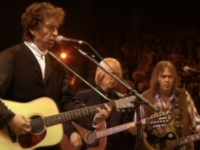Neil Young closed his solo set at this year’s Farm Aid with a rendition of “Changes.” Though little known today, Phil Ochs’ romantic ballad once set the heart of many a hippie girl aflame with dreams of soft-spoken knights and shining guitars.
“Changes” is an ode to love and life’s ephemera, set to a gently flowing melody, that ends on a bittersweet note of farewell: “Your tears will be trembling, now we’re somewhere else. One last cup of wine we will pour. I’ll kiss you one more time, and leave you on the rolling river shore of changes.”
Introducing his performance on Sunday, Neil complimented Ochs, calling him “one of the greatest songwriters who ever lived.” This is high praise, indeed: Surely, Neil can’t be putting Phil Ochs (Phil who?) in a league with artists as fine as Bob Dylan, Leonard Cohen and Paul McCartney? Yet far from suggesting a case of early mental deterioration in the aging Young, I believe his words were carefully chosen and his tribute well-deserved.
A promising protest singer rivaling Dylan, a cinematic composer and storyteller, an overweight Elvis impersonator, a distraught alcoholic running from the FBI and his own paranoia, a tragic suicide at 35: Ochs (1940-1976) had a life that writers and filmmakers dream of. And indeed, since his untimely death, two movies and two biographies have been released to chart the troubled course of his days and times. Yet when the beautiful, strange and sad stories of his life have been told, it is the music that remains.
His trilogy of Elektra albums, All the News That’s Fit to Sing (1964), I Ain’t Marching Anymore (1965) and Phil Ochs in Concert (1966), show his dedication to the cause of Civil Rights and the anti-war movement. Yet among the journalistic battle cries, the poet’s voice is already strong. His 1967 shift to A&M Records, together with wider musical and political changes, further turned his music into a more introspective and artistic direction.
While the topical material never disappeared, the fascist-killing guitar-slinger gave way to a poignant voice of love and despair, sailing the tides of elaborate orchestral arrangements, with Lincoln Mayorga’s beautiful piano-playing a frequent undercurrent.
Among more upbeat material, Ochs’ four A&M records contain a string of ballads so heart-breakingly beautiful that it is not merely a pity, but a crime, that they aren’t more widely known. There’s “Jim Dean of Indiana,” a tribute to Ochs’ childhood hero set to one of his most haunting melodies. There’s the sprawling tale of a sailor’s troubled homecoming in “Pleasures of the Harbor.” And finally there’s “No More Songs,” concluding his last album with a painful declaration of inconsolable despair: the despair of a patriot forsaken by his country, an artist betrayed by his muse.
One of Ochs’ best-loved songs opens with the line, “There is no place in this world where I’ll belong when I’m gone.” He was wrong. When Young introduced Ochs to the crowd and sang “Changes” at a gathering dedicated to the struggle against poverty, for a moment his spirit was again where it belongs. And as long as America values great art, fierce idealism, and heart-felt music, it can never turn away Ochs’ music as it once — or so he felt — turned away the man.
- Why Warren Zevon Shouldn’t Only Be Remembered For a Novelty Single - September 7, 2023
- Thanksgiving Songs From Bob Dylan, Joan Baez + Others: Gimme Five - November 25, 2021
- Dory Previn, “The Lady With the Braid” (1971): One Track Mind - November 27, 2019




